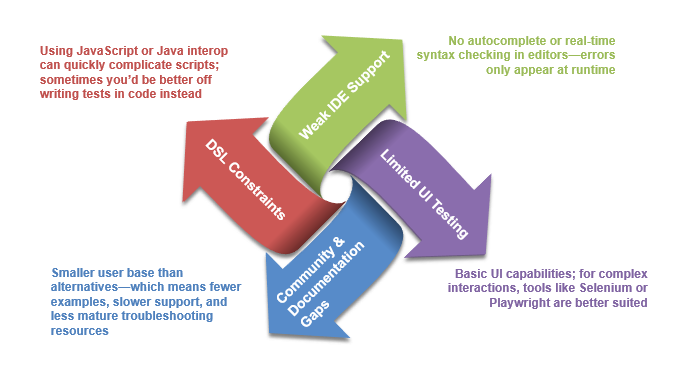Karate, according to Karate Labs, is the only open-source tool that unifies API test automation, mocks, performance testing, and UI automation into a single framework. Using Behavior Driven Development (BDD) syntax enables easy scenario writing, even for non-programmers. With built-in assertions, a reporting mechanism, and parallel test execution, Karate streamlines project development and maintenance by offering compile-free, readable code.
Key Features of Karate
- Utilizes the easy-to-understand Gherkin language.
- Requires no advanced programming knowledge like Java.
- Offers built-in parallel testing capabilities, eliminating the need for external tools like Maven or Gradle.
- Includes a UI for debugging tests.
- Built on popular Cucumber standards.
- Simple to create and set up a testing framework.
- Allows calling one feature file from another.
- Provides built-in support for Data-Driven Testing, eliminating the need for external frameworks.
- Features native REST reporting, with optional integration with Cucumber for enhanced UI reports and clarity.
- Offers in-house support for switching configurations across different testing environments (QA, Stage, Prod, Pre-Prod).
- Seamlessly integrates with CI/CD pipelines.
- Supports various types of HTTP calls, including:
- WebSocket support
- SOAP requests
- HTTP
- Browser cookie handling
- HTTPS
- HTML-form data
- XML requests
Karate vs. Rest-Assured: A Comparison
- Rest-Assured: A Java-based library designed for testing REST services, Rest-Assured allows you to write test scripts using Java. It excels at handling various request types, enabling the verification of different business logic combinations.
- Karate Framework: A Cucumber/Gherkin-based tool, Karate is used for testing both SOAP and REST services. It offers an easy-to-understand syntax, making it accessible to both technical and non-technical users.
Rest-Assured Karate Plain Text No Yes Parallel Execution Partial Yes Data Driven Testing Not built in built in Compared with Cucumber enhancement
Cucumber Karate Built in Step Definitions No Yes Parallel Execution No Yes Re-use feature files No Yes
For a more detailed comparison, visit Karate VS RestAssured
Why Karate?
Karate is worth adopting because it unifies API, UI, mock‑service and performance testing in a single, low‑code framework while remaining fast, readable, and easy for both testers and developers to maintain. Its domain-specific language (DSL) enables even non-Java teams to write plain-text scenarios, while still integrating smoothly with Java and CI/CD pipelines.
1. Unified Feature Set
Karate is the only open-source tool that combines API automation, UI automation (via a Selenium-free engine), service virtualization mocks, and Gatling-powered performance testing in one framework, eliminating the need for multiple tools.
-
1.1 API + Web in the Same Script
Within a single feature file, you can switch from calling a REST endpoint to driving a browser, enabling true end‑to‑end scenarios without context‑switching or extra libraries.
-
1.2 Re‑usable Performance Tests
Karate lets you reuse functional API tests as Gatling load tests, saving the effort of rewriting user flows in a separate performance tool.
2. Productivity & Ease of Use
-
2.1 Low‑Code DSL
Tests are written in a Gherkin‑like syntax that hides Java boilerplate; glue code is unnecessary, lowering the barrier for non‑programmers.
-
2.2 Less Code, Faster Feedback
Because feature files are plain text and do not need compilation, developers iterate faster than with code‑heavy libraries like Rest Assured.
-
2.3 Built‑In Assertions & Reports
Karate ships with powerful JSON/XML matchers and generates rich HTML reports out of the box, so teams spend zero time wiring external assertion or reporting frameworks.
3. Performance & Scalability
Parallel execution is built‑in; benchmarks show Karate tests often run faster than equivalent Rest Assured suites, which matters when suites grow large.
4. Team Collaboration & Maintainability
-
No Java prerequisite: Business testers can contribute directly, improving coverage and shared understanding.
-
Single truth of test logic: API specs, functional checks, mocks, and load profiles live in one place, reducing duplication and drift.
-
CI/CD ready: Karate runs via JUnit/TestNG and generates standard reports that integrate seamlessly with Jenkins, GitHub Actions, Azure DevOps, and other platforms, eliminating the need for plugins.
5. When Karate Shines
| Scenario | Why Karate Helps |
|---|---|
| Green‑field API project | Rapid authoring & mocks speed up backend‑frontend co‑development |
| Microservices with contract testing | DSL assertions keep contracts readable; mocks isolate services |
| Teams with mixed skill levels | Non‑coders write tests; engineers extend with Java only when needed |
| Need one tool for API + UI | Avoids juggling Selenium/WebDriver + Rest Assured |
6. Potential Limitations
Karate’s power comes from its opinionated DSL—teams needing highly customised Java code or advanced XML handling may prefer lower‑level libraries.
-
Challenges in Karate Framework

Karate is great for quick, readable API tests, but it has limitations in IDE support, type safety, UI complexity, and community resources. For more advanced scenarios, you may need to combine it with other tools or use more code-centric frameworks.
Tools Needed for Working with the Karate Framework
Eclipse
Eclipse is an Integrated Development Environment (IDE) widely used for Java programming. It serves as a robust platform for developing and managing Karate projects.
Maven
Maven is a build automation tool primarily used for Java projects. It facilitates setting up a Karate environment and managing project dependencies. To configure Eclipse with Maven, you can follow the instructions for Maven installation here.
To use Karate with Maven, you’ll need to include the following dependencies in your pom.xml.
<dependencies>
<dependency>
<groupId>com.intuit.karate</groupId>
<artifactId>karate-apache</artifactId>
<version>0.9.6</version>
<scope>test</scope>
</dependency>
<dependency>
<groupId>com.intuit.karate</groupId>
<artifactId>karate-junit4</artifactId>
<version>0.9.6</version>
<scope>test</scope>
</dependency>
</dependencies>
Note: The latest versions of these dependencies may be available in the Maven repository.
If we wanted to enable Cucumber reporting, the following dependency is also to be added.
<dependency> <groupId>net.masterthought</groupId> <artifactId>cucumber-reporting</artifactId> <version>5.3.0</version> </dependency>
Java Environment Setup on Your System
You’ll need to set up the JDK (Java Development Kit) and JRE (Java Runtime Environment) on your system to start working with Karate Framework scripts.
Now with this, we are all set to start with creating the Karate framework.
Conclusion
This overview highlights the advantages of the Karate Framework for API testing, offering a simpler and more accessible alternative to other tools, such as Rest-Assured, by reducing the need for advanced programming knowledge and offering powerful built-in features.
Adopting Karate can reduce your test tool stack, speed up automation, and make quality a shared responsibility across technical and non‑technical roles. By covering functional, load, and even UI tests with the same syntax, teams gain faster feedback, simpler maintenance, and a smoother path to continuous delivery.

